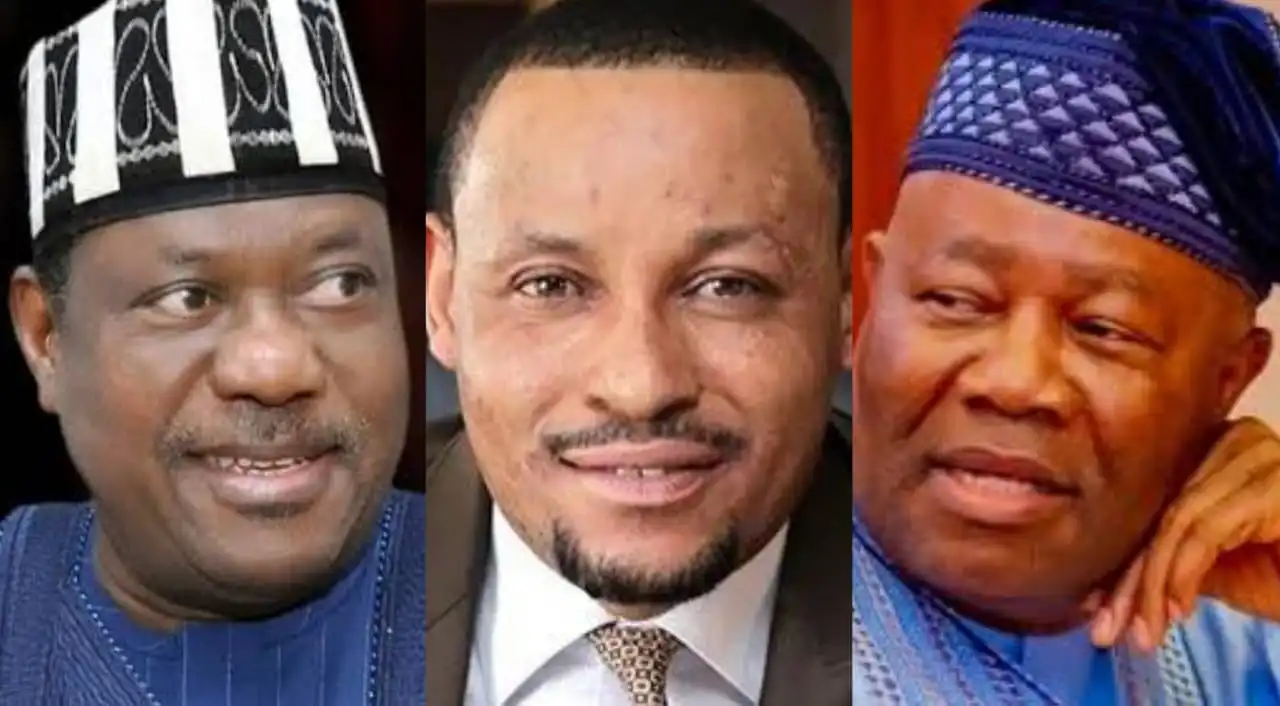News
SGF Goofs in Backdated Letters on CCT Chairman Appointment with Conflicting Serial Numbers

The desperate attempt to remove the embattled Code of Conduct Tribunal (CCT) Chairman, Mr. Danladi Umar, has taken a controversial turn, raising serious questions about procedural irregularities and constitutional breaches.
Following previous missteps, including the premature announcement of a new CCT Chairman by former Presidential Spokesperson Ajuri Ngelale and the National Assembly’s failure to meet the required quorum, the Secretary to the Government of the Federation (SGF), Senator George Akume, has further complicated the situation. He issued two conflicting letters, both backdated to give the appearance of a legitimate transition, but riddled with inconsistencies in dates and serial numbers.
Contradictions in Disengagement and Appointment Letters
Documents obtained by PRNigeria reveal that the letter disengaging Umar from his position as CCT Chairman was dated January 6, 2025, but backdated to take effect from November 26, 2024. However, a separate letter appointing Dr. Mainsara Umar Kogo as the new Chairman was dated January 20, 2025, yet was also backdated to take effect from November 27, 2024—just a day after Umar’s removal.
Most notably, the reference numbers on these documents contradict the chronological sequence of events. The disengagement letter issued to Umar bears the reference number SGF.19/S.24/C.1/T/177, while the appointment letter for Kogo, issued 14 days later, inexplicably carries an earlier reference number: SGF.19/S.24/C.1/T/176. This suggests Kogo’s appointment was documented before Umar’s removal, further exposing irregularities in the process.
Omission of Constitutional Justifications
Another glaring inconsistency is the SGF’s failure to cite the relevant constitutional provisions in Umar’s disengagement letter. The letter merely states:
“I write to inform you that His Excellency, Bola Ahmed Tinubu, GCFR, President, Federal Republic of Nigeria, in the exercise of his powers, has approved your disengagement as Chairman, Code of Conduct Tribunal, with effect from 26th November, 2024, following the resolution of the National Assembly. While conveying Mr. President’s appreciation to you for your services to the nation during your tenure, may I wish you God’s guidance and best of luck in your future endeavors.”
In contrast, Kogo’s appointment letter explicitly references Paragraph 15(3) of the Fifth Schedule of the 1999 Constitution (as amended) and Section 20(4) of the Code of Conduct Bureau and Tribunal Act, Laws of the Federation of Nigeria, 2004. This omission raises questions about the legality of Umar’s removal, as the constitutional process for such an action appears to have been ignored.
Legal Violations in Umar’s Removal
Meanwhile, the 1999 Constitution, as amended and cited by SGF, clearly outlines the procedure for appointing and removing a CCT Chairman: Paragraph 15(3) of the Fifth Schedule: “The Chairman and members of the Code of Conduct Tribunal shall be appointed by the President in accordance with the recommendation of the National Judicial Council (NJC).”
Paragraph 17(3) of the Fifth Schedule: “A person holding the office of Chairman or member of the Code of Conduct Tribunal shall not be removed from his office or appointment by the President except upon an address supported by a two-thirds majority of each House of the National Assembly, praying that he be so removed for inability to discharge the functions of the office in question (whether arising from infirmity of mind or body), for misconduct, or for contravention of this Code.”
Paragraph 17(4) of the Fifth Schedule: “A person holding the office of Chairman or member of the Code of Conduct Tribunal shall not be removed from office before the retiring age except in accordance with the provisions of this Code.”
Despite these constitutional safeguards, there is no evidence that that the National Judicial Council (NJC), chaired by Chief Justice of Nigeria, Justice Kudirat Kekere-Ekun, recommended a new CCT Chairman. There is also no evidence that the National Assembly met the two-thirds majority requirement for Umar’s removal.
Moreover, there is no also evidence suggesting that both houses of the National Assembly have met the required quorum or followed the proper procedures for engaging and disengaging a CCT Chairman. This matter is currently before Justice James Omotosho of the Federal High Court before the recent letters.
Interestingly, despite the purported dismissal, Umar has been invited by the police for questioning over allegations of “Obstruction and Conduct Likely to Cause Breach of Peace.”
FG’s Track Record of Blunders on CCT Leadership
This is not the first time the Federal Government has mishandled attempts to remove the CCT Chairman. In 2024, the Senate, led by Senator Godswill Akpabio, attempted to invoke Section 157(1) of the 1999 Constitution to remove Umar, citing allegations of and misconduct. However, a PRNigeria fact-check revealed that Section 157 applies to the Code of Conduct Bureau (CCB), not the CCT, making the move legally untenable.
Additionally, the Senate previously confused the appointment of Abdullahi Usman Bello, who was cleared to chair the CCB, with that of the CCT—another embarrassing legal misstep.
Targeting Umar: Political or Legal?
Curiously, following his contested removal, Umar has now been invited by the police for questioning over allegations of “Obstruction and Conduct Likely to Cause a Breach of Peace.” This development raises concerns that his removal might be politically motivated rather than based on any proven misconduct.
As the controversy unfolds, legal experts and constitutional scholars argue that the Federal Government’s handling of the CCT leadership transition not only violates established legal procedures but also raises serious credibility concerns about the administration’s adherence to the rule of law.
The series of blunders, including backdated letters, contradictory serial numbers, and the omission of constitutional requirements, raises serious doubts about the legality of Danladi Umar’s removal and Mainsara Umar Kogo’s appointment. Without adherence to due process, the Federal Government risks another embarrassing legal defeat, further eroding public trust in its governance.
Credit: PRNigeria
News
Infrastructure: Kalu Builds New Classrooms, Roads, Boreholes In Bende Communities+PHOTOS

By Gloria Ikibah
Communities in Bende Federal Constituency, Abia State, are beginning to see visible signs of change as Deputy Speaker of the House of Representatives, Rep. Benjamin Kalu recently launched a series of public infrastructure projects.
The initiative, which began on Friday, took Kalu across three key wards Bende, Itumbauzo, and Uzuakoli, where he formally opened a number of completed facilities. These include blocks of classrooms, administrative offices, rehabilitated roads, and new boreholes.

Bende Constituency, one of the largest in the country with 13 wards, has long grappled with infrastructure gaps. The newly delivered projects are seen as part of a broader effort to close those gaps and raise the standard of living in the area.
Residents say the projects are already making a difference in both school attendance and ease of movement between villages. Many hope this momentum continues in the months ahead.


News
Deputy Speaker Leads Defection of PDP Stalwart Chris Igwe, 13,000 Followers to APC In Abia

News
Speaker Abbas Raises Alarm on Workplace Safety in Nigeria

…as labour minister call for stricter laws to protect workers
By Gloria Ikibah
Speaker of the House of Representatives, Rep. Abbas Tajudeen, has expressed serious concern over the state of workplace safety in Nigeria, calling for urgent legislative action to prevent further injuries and fatalities.
Speaker Abbas made the call during the 2025 World Day for Safety Conference, with the theme: “The Legislative Perspective: Safety First – Building a Safer Future for All Nigerians”, organised by the House Committee on Safety Standards and Regulations at the National Assembly complex on Tuesday.
The Speaker who was represented by Ondo lawmaker, Rep. Oluwatimehin Adelegbe, said that the occasion was a reminder of the need to protect Nigerian workers from occupational hazards.
He said: “Today’s event is very significant, especially in the lives of workers across the globe. It reminds us of the need to guarantee the safety of workers against occupational hazards and fatalities.
“In societies where life is not given the right premium, workers are exposed to various accidents and dangers. Every worker has a right to be protected.”
Speaker Abbas acknowledged the global importance of the World Day for Safety, which was launched in 2003 by the International Labour Organization (ILO), and shared alarming statistics. “About 2.3 million workers lose their lives every year from workplace injuries and health hazards, with about 160 million non-fatal injuries,” he noted.
Abbas lamented the lack of reliable data In Nigeria, and said the most recent figures—238 deaths and 3,461 injuries in the construction industry—date back to between 2014 and 2016. “Even those reports are incomplete,” he added.
He also cited a study at the Federal Medical Centre in Asaba, which found that 52.7 percent of health workers surveyed had experienced needle pricks, while 53.3 percent reported incidents of blood splashes, and linked this to greater risks during outbreaks like Ebola and COVID-19, recalling the sacrifices of Dr. Ameyo Adadevoh and Nurse Justina Ejelonu, who died after coming in contact with the index Ebola case in 2014.
The Speaker blamed many of the injuries in construction sites and criticised the neglect of safety in public buildings.
“Unsafe acts and unsafe working conditions, including lack of personal protective equipment (PPE), hoisting gear, appropriate scaffolds and ladder protection.
“Most public buildings and workplaces in Nigeria are design-built and opened for use without safety checks. Apart from fire extinguishers, you hardly see buildings marked with reflective signs that guide workers in emergencies”, he lamented.
Abbas promised that the House would review and streamline existing laws to improve enforcement and public health protections.
“As the law-making body, the House of Representatives is poised to cause the necessary review of existing laws and seek ways to make them more effective in safeguarding public health and safety”, he added.
The Chairman Committee on Safety Standards and Regulations, Rep. David Idris Zacharias in his welcome address said the event marked a historic moment in our nation’s journey towards building a safer, more resilient society.
He stressed that safety must be prioritized, embedded in every policy, and included in every planning phase of our national projects. Whether it’s construction, road, workplace, environmental, or food safety, these are not peripheral issues—they are central to our well-being.
According to Zacharias, the committee’s mission is not only to pass laws but to ensure they are implemented effectively.
He acknowledged that enforcement gaps, poor awareness, and weak appreciation of safety still plague the country. However, he added, and that these challenges present us with immense opportunities to innovate, collaborate, and learn from others.
The committee chairman therefore called for partnerships with businesses, labour unions, NGOs, and the public.
He promised stronger enforcement, increased funding, more monitoring, and public awareness campaigns.
“Safety must be everyone’s concern. From the smallest corner shop to the largest industrial complex, we all have a role to play. We envision a future where safety is embedded in every organisation’s culture, every construction project, and every government policy,” he said.
The Minister of Labour and Employment, Dr. Muhammadu Maigari Dingyadi, in his message called for stronger legislation and cooperation among stakeholders to build a safer work environment for all Nigerians.
He also emphasised that while innovation is necessary, it must not come at the cost of workers’ welfare.
He said: “The theme of today’s conference, The Legislative Perspective: Building a Safer Future for All Nigerians, highlights the critical role of legislation in helping to shape a resilient and future-ready occupational safety and health framework.
“Legislation is central to navigating the digital frontier responsibly; ensuring that innovation does not erode the foundational rights, dignity, and welfare of the Nigerian worker.
“The safety of our workers must be anchored on secure technologies, sound data protection, and inclusive policy frameworks that uphold international labour standards”.
Dr. Dingyadi also stressed the importance of collaboration through the tripartite model involving government, employers, and workers’ organizations, to ensure policies are both enforceable and inclusive.
He further acknowledged delays in reviewing labour laws but said progress had been made, and called for unity across all sectors to build a lasting culture of safety.
“Year 2024 marked significant progress with the publication of Nigeria’s revised OSH Country Profile and the Federal Executive Council’s approval of landmark OSH regulations such as the Construction Safety Regulations 2024”, he added.
The Minister also spoke about the Occupational Safety and Health (OSH) Bill, which he said was developed through wide consultations.
“The Ministry has led the development of the Occupational Safety and Health Bill, which has been crafted through our distinctive Tripartite Plus framework. We count on the continued partnership of all stakeholders to make this a reality.
“Together, let us rise to the challenge of building a resilient safety culture, underpinned by innovation, inclusivity, and a shared commitment to protecting the lives of all Nigerian workers”, Dingyadi stated.
-

 News14 hours ago
News14 hours agoCourt dismisses Emefiele’s bid to reclaim forfeited 753 duplex estate
-

 News5 hours ago
News5 hours agoJust in: Popular Nigerian billionaire, E-Money nabbed by EFCC
-

 Opinion10 hours ago
Opinion10 hours agoTHOUGHTS ON CONSTITUENTS DEVELOPMENT IN OBIO-AKPOR
-

 Metro14 hours ago
Metro14 hours agoWanted CBEX promoter surrenders to EFCC
-

 News6 hours ago
News6 hours agoKing Sunny Ade’s family opens up over his whereabouts after daughter’s alarm
-

 Politics14 hours ago
Politics14 hours agoPDP Calls Emergency Session as Top Members Flee to APC
-

 News7 hours ago
News7 hours agoEx-DIG,Olofu debunks online newspaper report, says ” I retired from NPF meritously after 35yrs service
-

 Entertainment15 hours ago
Entertainment15 hours agoCubana Chief Priest responds following reports of being denied entry at Headies Awards


















